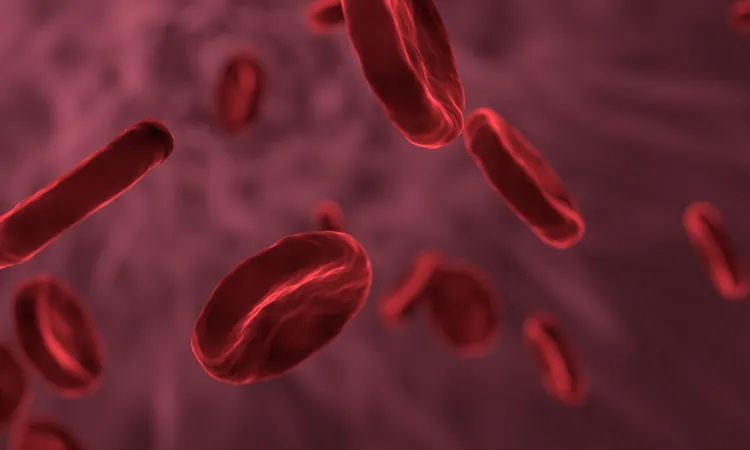
Muscle Cramps: The Surprising Truth Behind Those Painful Nighttime Spasms and How to Prevent Them!
2024-10-31
Author: Mei
Have you ever been startled awake in the middle of the night by an excruciating muscle cramp? If so, you're not alone! An alarming 30% of adults experience nocturnal leg cramps at least five times a month, and they can strike even if you haven’t been overly active that day. But what causes these sudden, painful contractions, and can they harm your muscles? Let’s dive into the science and explore prevention strategies that could save you from this nightly ordeal.
What Are Muscle Cramps?
Muscle cramps are sudden, involuntary contractions of the muscles, often happening in the calf or foot arch. According to Dr. Ang Mu Liang, an orthopaedic consultant, cramping occurs due to overexcited muscle fibers, often triggered by misfiring nerve impulses or a deficiency in essential electrolytes like potassium, calcium, and magnesium.
Why Do Cramps Strike When We’re at Rest?
You might wonder why cramps occur when you're lying peacefully in bed with little physical activity. Physiotherapist Zachary Poon Qi Jing points out that the mechanism behind nighttime cramps is distinct from daytime triggers. The shift from rapid eye movement (REM) sleep to non-REM sleep can cause a sudden increase in muscle tone, which may result in cramps.
Does Age Matter?
While cramps aren't directly caused by aging, decreased activity levels and age-related health issues can make older adults more susceptible. Conditions that affect the nervous or metabolic systems, along with medication side effects, contribute to frequent cramps in this demographic. Dr. Ang notes that muscle mass naturally declines with age, further exacerbating the likelihood of experiencing cramps.
Which Muscle Groups Are Most Affected?
The muscles that frequently cramp are typically those that are overused or fatigued. Common culprits include: - **Calves**: Often cramp due to inactivity or overuse. - **Hamstrings**: Can spasm after sitting too long or following intense physical exertion. - **Feet**: Poor footwear or circulation issues can lead to uncomfortable cramps. - **Hands**: Repetitive use or nerve compression is a frequent cause. - **Abdominal muscles**: May cramp due to dehydration or excessive exertion.
What Do Cramps Feel Like?
While muscle cramps are generally painful, sensations can vary depending on the muscle group involved. They often start suddenly and may feel like a tightening or spasm, sometimes accompanied by tingling. Dr. Ang emphasizes that following these cramps, you might experience residual stiffness and discomfort due to reduced blood flow.
How to Tackle a Cramp
When a cramp strikes, immediate relief is key. Goh suggests gently stretching the affected muscle and applying heat to encourage relaxation. After the pain subsides, using ice can also help mitigate discomfort. Maintaining proper hydration and replenishing electrolytes through foods like bananas or isotonic drinks can have preventative benefits as well.
Are There Long-Term Effects of Cramps?
Chronic muscle cramps can raise concerns about underlying health issues. While occasional spasms are typically harmless, consistent cramps coupled with muscle weakness, discoloration, or swelling warrant a visit to your doctor. These could indicate more serious conditions like peripheral artery disease or nerve compression.
Prevention is Better Than Cure!
To minimize the occurrence of cramps, incorporating regular physical activity and targeted stretching into your routine is essential. Specific exercises can bolster muscle endurance and flexibility, particularly focusing on the calves, quadriceps, and hamstrings. Furthermore, consider adding magnesium, potassium, and calcium supplements to your diet to combat potential electrolyte imbalances effectively.
Overall, while muscle cramps may seem like a minor nuisance, understanding their causes and symptoms can empower you to manage and even prevent them. Don’t let these nighttime intruders disrupt your sleep—take action today for better nights ahead!


 Brasil (PT)
Brasil (PT)
 Canada (EN)
Canada (EN)
 Chile (ES)
Chile (ES)
 España (ES)
España (ES)
 France (FR)
France (FR)
 Hong Kong (EN)
Hong Kong (EN)
 Italia (IT)
Italia (IT)
 日本 (JA)
日本 (JA)
 Magyarország (HU)
Magyarország (HU)
 Norge (NO)
Norge (NO)
 Polska (PL)
Polska (PL)
 Schweiz (DE)
Schweiz (DE)
 Singapore (EN)
Singapore (EN)
 Sverige (SV)
Sverige (SV)
 Suomi (FI)
Suomi (FI)
 Türkiye (TR)
Türkiye (TR)